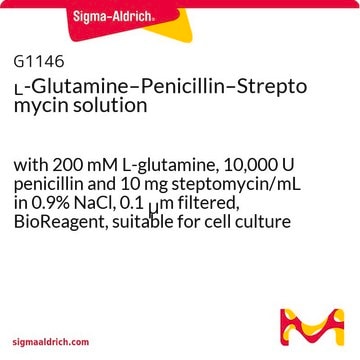11074440001
Roche
Penicillin-Streptomycin
suitable for cell culture, lyophilized (clear, colorless solution after reconstitution), non-sterile; 0.2 μm filtered, sufficient for 20 mL
Synonym(s):
antibiotic
About This Item
Recommended Products
sterility
non-sterile; 0.2 μm filtered
Quality Level
form
lyophilized (clear, colorless solution after reconstitution)
usage
sufficient for 20 mL
manufacturer/tradename
Roche
concentration
50 mg/mL streptomycin in 0.9% NaCl (as sulfate)
50,000 U/mL penicillin in 0.9% NaCl
technique(s)
cell culture | mammalian: suitable
antibiotic activity spectrum
Gram-negative bacteria
Gram-positive bacteria
Mode of action
cell wall synthesis | interferes
protein synthesis | interferes
storage temp.
2-8°C
General description
Sensitive organisms:
- Gram-positive bacteria (penicillin)
- Gram-negative bacteria (streptomycin)
- Stability:Penicillin: 3 days
- Streptomycin: 3 days in media at +37 °C
Application
Physical form
Preparation Note
100 μg/ml streptomycin
Reconstitution
Other Notes
Signal Word
Danger
Hazard Statements
Precautionary Statements
Hazard Classifications
Acute Tox. 4 Oral - Repr. 2 - Resp. Sens. 1 - Skin Sens. 1
Storage Class Code
11 - Combustible Solids
WGK
WGK 3
Flash Point(F)
does not flash
Flash Point(C)
does not flash
Certificates of Analysis (COA)
Search for Certificates of Analysis (COA) by entering the products Lot/Batch Number. Lot and Batch Numbers can be found on a product’s label following the words ‘Lot’ or ‘Batch’.
Already Own This Product?
Find documentation for the products that you have recently purchased in the Document Library.
Customers Also Viewed
Our team of scientists has experience in all areas of research including Life Science, Material Science, Chemical Synthesis, Chromatography, Analytical and many others.
Contact Technical Service









